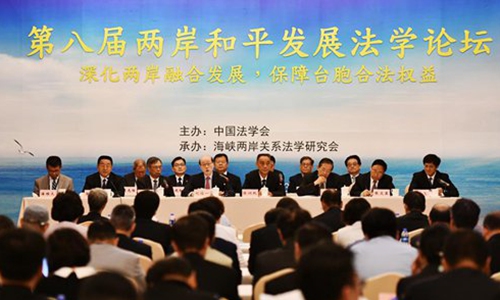HOME >> CHINA
Senior official expounds on peaceful reunification
By Yang Sheng Source:Global Times Published: 2019/12/13 0:43:39 Last Updated: 2019/12/13 9:23:12

Tourists visit Juancun village in Penghu, southeast China's Taiwan, Aug. 27, 2019. (Photo: Xinhua)
A senior Chinese mainland official responsible for Taiwan affairs published an article in the flagship newspaper of the Communist Party of China (CPC) Thursday to expound on plans to realize reunification, the same day the US House of Representatives passed the 2020 National Defense Authorization Act which includes parts related to the Taiwan question.
Chinese experts noted that publishing such an article at this time, a month ahead of Taiwan's regional "election," showed that no matter which political party, pro-status quo or pro-secessionist, wins the election next year, the principle and grand strategy that the mainland holds won't change, and the mainland has enough confidence and strength to dominate and actively shape the process of reunification regardless of what happens inside the island and what the US does to interfere.
The People's Daily on Thursday published an article by Liu Jieyi, head of the Taiwan Work Office of the CPC Central Committee and the Taiwan Affairs Office of the State Council, titled "Firmly advance the process of peaceful reunification of the motherland."
The article reflected the thorough study and implementation of the Fourth Plenary Session of the 19th CPC Central Committee on the Taiwan question.
Liu said in the article, "peaceful reunification, the 'one country, two systems' principle is the basic policy for solving the Taiwan question and the best way to achieve national reunification."
"The development of the mainland is fundamentally determining the direction of the cross-Straits relationship…On the strength comparison between the two sides of the Straits, the mainland has realized comprehensive and overwhelming advantage toward Taiwan," he said.
Li Xiaobing, an expert on Hong Kong, Macao and Taiwan at Nankai University in Tianjin, told the Global Times on Thursday that "this shows the mainland and the CPC's confidence and judgment on the Taiwan question has not been affected by the current situation."
In 2019, Li said, Taiwan secessionist forces used the Hong Kong turmoil to demonize the "one country, two systems" principle.
The US has been stepping up efforts to support Taiwan secessionists with arms sales and domestic legislation, and piling diplomatic pressures on the countries who cut off "diplomatic" ties with the island, he said.
"But this hasn't changed the fact that the mainland is getting more and more initiatives in the process of solving the Taiwan question," Li said.

Liu Jieyi, head of the Taiwan Work Office of the Communist Party of China Central Committee and the Taiwan Affairs Office of the State Council, addresses the opening ceremony of the eighth Cross-Strait Legal Forum for Peaceful Development in north China's Tianjin, Aug. 22, 2019. Photo: Xinhua
The key source of this confidence is the development of the mainland, said Song Luzheng, a research fellow and an expert on Taiwan studies at the China Institute of Fudan University in Shanghai.
Regardless of who is governing Taiwan, the mainland will have many measures and tools to integrate individuals and specific groups of the Taiwan island into the national development plan and public opinion in Taiwan will gradually change, Song believed.
Liu said in the People's Daily article that the mainland will continuously strengthen its influence and attraction to Taiwan society, and strengthen its traction and domination of the development of the cross-Straits relationship.
The two sides of the Straits have become an unbreakable community with a shared future, Liu said, and the mainland has become Taiwan's biggest export market, import source, trade surplus source and investment destination outside the island.
Li of Nankai University said perhaps the current conditions for reunification are not very ideal, "but based on these facts, the mainland still has a lot of approaches and measures that can be used to include Taiwan into its development and has patience to actively shape conditions step by step."
In the past, he said, "We were nervous when the island held elections and worried about the victory of the Democratic Progressive Party (DPP), but now, we found that the process of reunification can still be pushed forward even if the DPP is governing the island and maybe the process has even moved faster than the era of the Kuomintang in many fields."
Li noted declining international recognition for Taiwan while the mainland directly attracts Taiwan people, especially youth, to study, work and start up businesses.
"In the future, with no doubt, the number of the countries having diplomatic ties with Taiwan will be further reduced, even to zero. More policies that encourage the people-to-people integration across the Straits will also be issued."
Earlier on Thursday, the US House of Representatives passed the National Defense Authorization Act for Fiscal Year 2020, and Chinese experts agreed that the US will likely keep or even step up its interference over the Taiwan question in the future.
Session 1257 of the act said that "the Secretary of Defense should continue regular transits of United States Navy vessels through the Taiwan Strait…and encourage allies and partners to follow suit in conducting such transits."
Li said the US is realizing that the mainland is getting more dominance in the reunification process and the US has to adjust its strategy to ensure it can still use the Taiwan question to make trouble for China and gain benefits.
A military expert at a Beijing-based military academy who asked for anonymity said, "These changes are meaningless. It's clear that Washington wants to maintain a presence in the region but carefully avoids further provocation. Because the US can't afford a military conflict with China so it is very unlikely to cross the red line on the Taiwan question. China's military strength is enough to reunify Taiwan and its advantage will be more and more overwhelming in the future. This is the condition for the mainland to push forward peaceful reunification."
The People's Liberation Army (PLA) is always prepared for the worst, he said. "If US and Taiwan secessionist forces make any unwise decision to cross the red line, the PLA is capable of dealing with the situation and even realizing reunification, although we know this is not the best way."
Posted in: HK/MACAO/TAIWAN,CHINA FOCUS